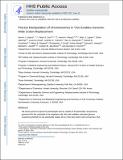| dc.contributor.author | Isaacs, Farren J | |
| dc.contributor.author | Carr, Peter A | |
| dc.contributor.author | Wang, Harris H | |
| dc.contributor.author | Lajoie, Marc J | |
| dc.contributor.author | Sterling, Bram | |
| dc.contributor.author | Kraal, Laurens | |
| dc.contributor.author | Tolonen, Andrew C | |
| dc.contributor.author | Gianoulis, Tara A | |
| dc.contributor.author | Goodman, Daniel B | |
| dc.contributor.author | Reppas, Nikos B | |
| dc.contributor.author | Emig, Christopher J | |
| dc.contributor.author | Bang, Duhee | |
| dc.contributor.author | Hwang, Samuel J | |
| dc.contributor.author | Jewett, Michael C | |
| dc.contributor.author | Jacobson, Joseph M | |
| dc.contributor.author | Church, George M | |
| dc.date.accessioned | 2021-10-27T20:05:55Z | |
| dc.date.available | 2021-10-27T20:05:55Z | |
| dc.date.issued | 2011 | |
| dc.identifier.uri | https://hdl.handle.net/1721.1/134637 | |
| dc.description.abstract | We present genome engineering technologies that are capable of fundamentally reengineering genomes from the nucleotide to the megabase scale. We used multiplex automated genome engineering (MAGE) to site-specifically replace all 314 TAG stop codons with synonymous TAA codons in parallel across 32 Escherichia coli strains. This approach allowed us to measure individual recombination frequencies, confirm viability for each modification, and identify associated phenotypes. We developed hierarchical conjugative assembly genome engineering (CAGE) to merge these sets of codon modifications into genomes with 80 precise changes, which demonstrate that these synonymous codon substitutions can be combined into higher-order strains without synthetic lethal effects. Our methods treat the chromosome as both an editable and an evolvable template, permitting the exploration of vast genetic landscapes. | |
| dc.language.iso | en | |
| dc.publisher | American Association for the Advancement of Science (AAAS) | |
| dc.relation.isversionof | 10.1126/science.1205822 | |
| dc.rights | Article is made available in accordance with the publisher's policy and may be subject to US copyright law. Please refer to the publisher's site for terms of use. | |
| dc.source | PMC | |
| dc.title | Precise Manipulation of Chromosomes in Vivo Enables Genome-Wide Codon Replacement | |
| dc.type | Article | |
| dc.contributor.department | Massachusetts Institute of Technology. Center for Bits and Atoms | |
| dc.contributor.department | Massachusetts Institute of Technology. Media Laboratory | |
| dc.contributor.department | Harvard University--MIT Division of Health Sciences and Technology | |
| dc.contributor.department | Massachusetts Institute of Technology. Department of Materials Science and Engineering | |
| dc.relation.journal | Science | |
| dc.eprint.version | Author's final manuscript | |
| dc.type.uri | http://purl.org/eprint/type/JournalArticle | |
| eprint.status | http://purl.org/eprint/status/PeerReviewed | |
| dc.date.updated | 2019-07-23T14:41:58Z | |
| dspace.orderedauthors | Isaacs, FJ; Carr, PA; Wang, HH; Lajoie, MJ; Sterling, B; Kraal, L; Tolonen, AC; Gianoulis, TA; Goodman, DB; Reppas, NB; Emig, CJ; Bang, D; Hwang, SJ; Jewett, MC; Jacobson, JM; Church, GM | |
| dspace.date.submission | 2019-07-23T14:41:59Z | |
| mit.journal.volume | 333 | |
| mit.journal.issue | 6040 | |
| mit.metadata.status | Authority Work and Publication Information Needed | |
